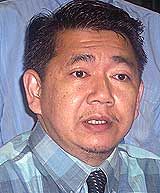Parliament speaker Pandikar Amin Mulia shot down an urgent motion tabled by Salahuddin Ayub (PAS-Kubang Kerian) to discuss the Terengganu oil royalty issue today - the first day of parliamentary debate.
Although Pandikar agreed that the motion fulfilled the conditions of “being specific” and was “in public interest”, he said it was “not of urgency” as to adjourn the current debate on the royal address by Sultan Mizan Zainal Abidin to discuss the matter.
He said the issue could still raise during the debate on the royal address which was presented by the Agong yesterday.
Despite that Pakatan Rakyat members of parliament stood up to support Salahuddin’s motion, it failed to move Pandikar to change his mind.
“All of you can discuss this in the debate royal address,” he said.
 According to Salahuddin (
left
), Terengganu’s oil royalty had been the subject of an agreement between the federal government and the state government since 1975.
According to Salahuddin (
left
), Terengganu’s oil royalty had been the subject of an agreement between the federal government and the state government since 1975.
However, this was wrongfully halted when PAS took over Terengganu following the 1999 general election, he added.
Since 2000, the oil royalty had been replaced with a special federal government fund - called ‘wang ehsan’ or goodwill payment - controlled by the ruling Barisan Nasional.
More than RM1 bil at stake
The royalty - about five percent of the state’s oil revenues - is estimated more than RM1 billion.
“If the government is willing to admit its mistake in sacking (former Lord President) Salleh Abas, then what is wrong if the government today admits its mistake in robbing the people’s money?” asked Salahuddin.
He said the oil royalty should not only be returned directly to Terengganu but increased by at least 10 percent.
“My colleagues in PAS conceded that Terengganu is now governed by Barisan Nasional, but in the name of the people, we seek the money be returned to serve the people,” he said.
Terengganu Mentri Besar Ahmad Said had also demanded that the oil royalty to be fully managed by his Umno-led state government.
He said direct control over the oil royalty would allow the state government to plan development projects without having to seek approval from the federal government.

